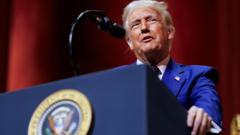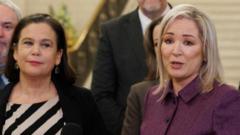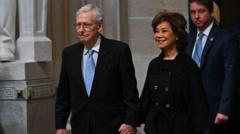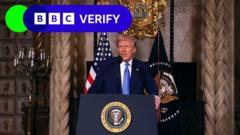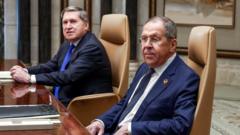This article delves into Donald Trump's evolving relationship with tariffs, which began in the late 1980s amid growing concerns about Japan's economic prowess. It examines how his early business experiences shaped his views on trade, leading to the aggressive protectionist policies seen during his presidency.
Tracing the Roots of Trump's Tariff Strategy: A Historical Perspective
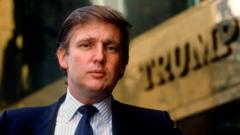
Tracing the Roots of Trump's Tariff Strategy: A Historical Perspective
An exploration of how Japan influenced Donald Trump's longstanding views on tariffs and trade policies, reflecting on his 40-year journey from New York's real estate to the Oval Office.
Donald Trump's tariffs are not merely a recent development of his administration; they are deeply rooted in his early business experiences, particularly regarding Japan's economic ascent in the late 20th century. In the 1980s, as Trump navigated the competitive waters of New York real estate, he became acutely aware of Japan's rising influence, which culminated in the purchase of iconic American assets and manufacturing dominance in electronics and automobiles. His frustration with this perceived imbalance laid the groundwork for his enduring belief in tariffs as a protective measure for American interests.
During this period, Trump expressed significant resentment towards fruitful transactions made by Japanese businessmen while American companies were facing setbacks. Barbara Res, former executive vice-president at the Trump Organization, states that Trump harbored jealousy for the attention and respect Japanese businessmen received in contrast to his own experiences. This sentiment contributed to a worldview where America's military support for Japan was seen as a one-sided arrangement, leaving the U.S. at a disadvantage.
In 1988, Trump's condemnation of trade agreements was publicly illustrated during a CNN appearance on "Larry King Live," where he lamented about "countries ripping off the United States." Five years before launching his presidential campaign, Trump's conviction that tariffs should be utilized as a corrective measure against economic competition became a defining characteristic of his political identity. His assertions were amplified by a full-page ad in major US newspapers, where he claimed Japan benefited disproportionately from U.S. military protections while fostering a successful economy.
Jennifer Miller, an associate professor at Dartmouth College, contextualizes Trump's frustrations within broader public discourse, as others also questioned America’s role within a global economy increasingly influenced by Japan. At the time, the concern wasn’t simply about the economy; it was also about the United States’ international positioning and influence.
Ahead of his presidency, Trump's narrative remained consistent—foreign allies were seen as freeloaders taking advantage of U.S. support. His stance reflects a protectionist ideology complementing his self-identification as a dealmaker, promising a more assertive foreign and economic policy. This view has since led to criticisms around his simplistic approach to complex trade relationships, with Clyde Prestowitz, a former counselor to the Secretary of Commerce, suggesting that genuine solutions must extend beyond mere tariffs.
As the economy evolved and China emerged as the U.S.’s most significant trade competitor, Trump maintained his fundamental approach, welcoming Japanese Prime Minister Shinzo Abe to the Oval Office, acknowledging the historical context of both rivalry and alliance.
Trump's focus on tariffs has reshaped Republican narratives around free trade. While some economists, like Joseph LaVorgna, argue that the intent behind Trump’s policy is to bolster domestic manufacturing, others identify risks in how these tariffs could impact both prices and international relations. Notably, economists like Michael Strain highlight the need for a nuanced understanding of trade, suggesting that Trump's fixation on tariffs oversimplifies the complexities of global commerce and could endanger long-standing economic partnerships.
As his presidency unfolded, Trump's unwavering adherence to his tariff strategy reflects a long-standing belief born from a mix of personal experience, competitive spirit, and a transactional outlook on international relations. The resulting conflict over trade remains a divisive issue within the U.S. political landscape, stirring debates regarding the balance between protective measures and collaboration among allies.

